May 12 is Environmental Sensitivities Day.
First my nose stings, then it runs, then my eyes get itchy. The skin of my nose feels tight, swollen, even pink. My breath becomes shallow — at worst I have difficulty breathing at all. I probably start coughing. I feel stressed and anxious.
This is what happens when I’m exposed to synthetic fragrance. I’m not alone, and I’m lucky: for some people it can trigger asthma, headaches, and allergic reactions that are worse than mine. But it’s still not fun, and I feel like I’m the only one in the vicinity suffering. Sometimes, I’m the only one that can smell it.
I never had this problem until I did a detoxifying cleanse three years ago, which is why I don’t believe it when I read claims that people with my affliction are simply overburdened with toxins. I think it’s the other way around — that most people, generally unbeknownst to them, are full of toxins that are preventing reactions to toxic chemicals.
Continue reading Scents and sensitivity: go fragrance-free »
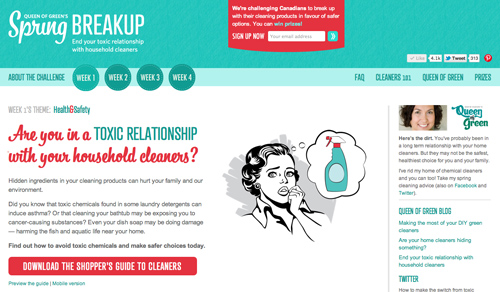
I’m not! I switched to vinegar and baking soda for most tasks years ago. I’m even considering making my own laundry detergent after I move out.
I have a confession to make, though: I used to like the smell of Mr. Clean. I’m sure a whiff of it now would send me into an allergic frenzy, but I broke up with Mr. Clean a long time ago. You can too, by going to SpringBreakup.ca, a campaign site my team at the David Suzuki Foundation recently launched with our Queen of Green.
Continue reading Are you in a toxic relationship with your household cleaners? »
I love GOOD Magazine for their content and design. I got a little emotional at work recently when I opened fifteen of their website’s articles just from their bottom-of-the-page grid — probably 95% of the content there. Inspired by their new “Overload” articles where an author with a similar habit to me — link-happy without enough time/energy to read everything in a day — posts snippets with links to interesting articles, here’s my first one. I might do this again later when I have lots to share but need to get my post out the door quickly.
Candy Chang is amazing. She’s started a community engagement project that uses stickers to enable people to imagine how neglected parts of New Orleans could be revitalized. You don’t have to be an urban planner to hope and dream about change in your community.
We’ve been saying all along that living sustainably is good for the economy too, and the New York Times reports that the Clean Air Act has benefits to the tune of $2 trillion annually by 2020. Time to leave the car at home more often, especially because sitting in traffic triggers more heart attacks than smoking and alcohol. Smoggy Los Angeles has a new bike plan that will hopefully deal with the pollution along with its street safety.
Continue reading Civic engagement by sticker, L.A. bike plan and other (mostly) good news »
I’m not all that surprised to learn that the results of a study shows gym class helps kids read better.
At the end of the article, after pointing out that the school studied has a lot of financial support available, Dwyer asks, “If getting in some exercise before starting school really does boost academic performance, what would it take to have fitness facilities like Naperville’s in high schools labeled as dropout factories?”
Continue reading Better education through urban planning »
Last night I watched a shocking episode of CBC Marketplace about superbugs in supermarket chicken. I knew about the routine use of antibiotics in factory farm animals — which account for most of our meat production, the most popular of which is chicken — but the degree to which antibiotic-resistant bacteria (aka superbugs) have developed is a disturbing new revelation. Daily use of antibiotics, often the same ones administered to sick humans, are being given to healthy and ill chickens alike. If chickens, cows, pigs and so forth had a natural diet and weren’t kept in such cramped conditions, the incidence of disease would be extremely low. Antibiotics wouldn’t be necessary, preventative or otherwise. Disease outbreaks would also be uncommon.
The human health threat posed by the presence of antibiotic-resistant bacteria — found on two-thirds of the 100 chicken packages sampled — has the potential to return us to pre-1930s conditions, says the study. Is the public health risk really worth cheaper chicken prices?
Antibiotics also kill the helpful bacteria in our gut, so I can only imagine how sick the patients profiled in this episode are from multiple attempts to cure their antibiotic-resistant infections.
This is just another reason among many — animal ethics, environment and others — to return to sustainable farming methods.
 This daily green blog challenge is in celebration of David Suzuki’s 75th birthday, supporting the David Suzuki Foundation. Please help me out by sponsoring me online now.
This daily green blog challenge is in celebration of David Suzuki’s 75th birthday, supporting the David Suzuki Foundation. Please help me out by sponsoring me online now.
Note: I am writing solely on my own behalf, and do not claim to represent the David Suzuki Foundation or its views here.
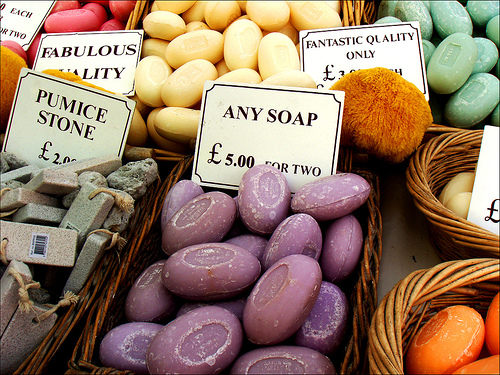
Fragrances lurk in all sorts of consumer products. They can be a toxic chemical soup of ingredients manufacturers aren’t required to disclose. (Photo by
Karin Bultje via Flickr)
Yesterday on transit, a woman began applying a hand lotion that, unbeknownst to her, triggered an allergic reaction in the passenger seated next to her. As the doors opened every few minutes, ushering in “fresh” air, I gasped for it, a brief relief from the fragrance from which I could otherwise not escape except by moving elsewhere. It wasn’t that the odour was unpleasant. This isn’t usually my problem. It’s that the chemicals in the fragrance irritate my nose — or brain, rather — in various ways, the worst of which is actually pain. I met a bus driver with the same issue: she spends her workday with a scarf covering her face.
So you can imagine when I walk into a department store where the perfumes invade the doorway that I hold my breath and scamper through as quickly as possible. I’ve done that years, but my reaction has developed in the last year and a half. While it’s unpleasant, it’s probably a good thing because it’s made me aware of the health problems associated with fragrance, also known as parfum, and helps me avoid it. But it’s pretty hard to avoid the scent left on my hands after using a public washroom.
Continue reading Fragrances not as lovely as they smell »
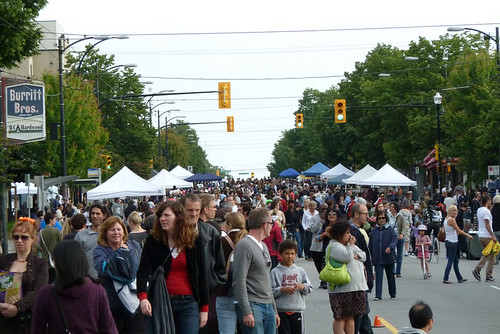
Crowd at Main Street’s Car Free Day, 2010
I made the observation recently that each of us learns to walk, then virtually everyone learns how to bike, then we’re taught to drive. At that point, it’s like the first two are reduced to merely leisure activities or, to some people, hard work. Curious, isn’t it? Culturally, being able to drive and having a nice car is a measure of success. You know, because the bus is the “loser cruiser.” At the same time, being fit and skinny is attractive. They’re a bit at odds with each other, are they not? Sorry, can’t come over tonight — gotta drive to the gym. Whew, now you’ve got car payments, parking fees, insurance, AND a gym membership to keep tabs on. Better get some cheap take-out for dinner.
Whoa, hold up!
How did we get ourselves into this mess? Cities are designed for cars, not people.
Continue reading Kick the pavement: cities are for people »
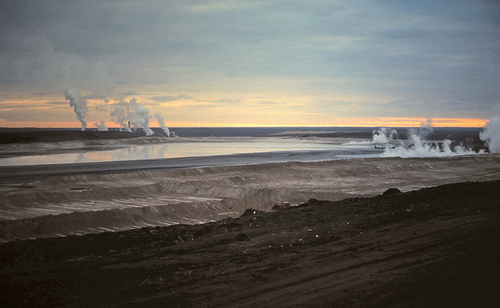
Tar sands excavation north of Fort McMurray, Alberta, in 1981. Despite a recession, the project continues to expand. (Photo by
CanadaGood via Flickr)
Update: Alberta continues fight against EU climate measures and Environment Minister Peter Kent outright lying to Parliament.
I was first introduced to the PR paradox of “ethical oil” when my friend Ben West at the Wilderness Committee went head-to-head with former tobacco industry lobbyist Ezra Levant in a debate on the subject. In this week’s Science Matters column, David Suzuki and Faisal Moola pull apart Levant and his fellow Conservatives’ argument, saying “the ‘ethical oil’ argument they promote has >holes as big as the ones in the ground around Fort McMurray.”
The environmental impacts alone should be a no-brainer. The razing of forests just to drill releases carbon dioxide — and if allowed to expand, an area of boreal forest the size of Greece will be industrialized with little hope of reclamation. The volume of greenhouse gases emitted prevent Canada from achieving any progressive, critical targets on GHG reductions and therefore thwart global efforts to reach consensus. The world’s largest construction project, the tar sands can be seen from space, but its effects are felt right here on earth, and no more deeply than by the First Nations downriver of the project, who are seeing higher than normal rates of rare cancers caused by toxic contaminants. Fish are turning up deformed, the water is polluted, the air is polluted. I see absolutely nothing ethical about this. It’s hypocritical for the Conservatives to suggest that oil from other nations be avoided because of human rights violations or lack of democracy. There is a human rights crisis going on in Prime Minister Steven Harper’s own back yard while his so-called “Environment Minister” Peter Kent claims our source of oil is ethical.
Continue reading Alberta’s tar sands a humanitarian issue, too »

My bathroom shelf: Toothpaste, coconut oil, shea butter, oregano oil, floss and deodorant
Let’s face it: women use more products than men, and we have a recurring, generally very wasteful (but otherwise healthy) function that they don’t have. But this doesn’t mean we need to create more garbage than these low-maintenance dudes. If you live in Metro Vancouver, you’ve seen the ads, you’ve seen the news. We create a lot of garbage, and we can’t throw it on Cache Creek forever. Our rubbish has to go somewhere, so it’s time to try harder to avoid creating it in the first place. (It’s reduce, reuse, recycle, remember.) But you’re a girl, and you have needs. Now what?
Simple.
1. Get an “eco positive period“ with the Diva Cup and a combination of smart panties and reusable cloth liners and pads. The fabrics are organic cotton and the Diva Cup merely collects your flow, so you can avoid nasty things like toxic shock syndrome and yeast infections. Other benefits? No smelly waste, no crinkly noises from plastic pads, no discomfort, and no worries about running out. Yes, it can be discreet, super fun, and still feel sexy. It will simply make your life easier, save you money and time in the long run, and reduce your footprint on the planet big time. If you’re still not convinced, read their testimonials and their tips. Lunapads is based in Vancouver. Hint: sign up for their newsletter and grab the Green Zebra coupon book to save some dough.
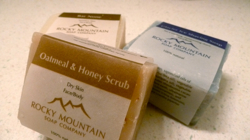 2. Happy soap! If you’re not into making your own, skip the shrinkwrap, the toxins and the plastic pumps with Rocky Mountain Soap Company‘s earth-friendly bar soap, wrapped in just a strip of paper. (Mountain Sky is another option.) They also sell a shaving* soap bar. I know you think you need foam to shave, but I dare you to try this stuff for a month and see the difference. I used to use bar soap that wasn’t even meant for shaving, then tried a foam cream in an aerosol can (what was I thinking?!). Rocky Mountain wins hands down. Their Vancouver store is on Granville & 15th, and they sell unscented soap too.
2. Happy soap! If you’re not into making your own, skip the shrinkwrap, the toxins and the plastic pumps with Rocky Mountain Soap Company‘s earth-friendly bar soap, wrapped in just a strip of paper. (Mountain Sky is another option.) They also sell a shaving* soap bar. I know you think you need foam to shave, but I dare you to try this stuff for a month and see the difference. I used to use bar soap that wasn’t even meant for shaving, then tried a foam cream in an aerosol can (what was I thinking?!). Rocky Mountain wins hands down. Their Vancouver store is on Granville & 15th, and they sell unscented soap too.
Continue reading 7 simple ways to reduce bathroom waste »
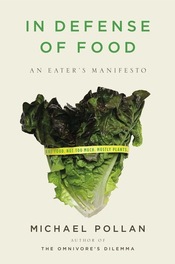 If that title seems confusing at first, the sentiment simply represents the chaotic experience of the modern North American in deciding what to eat.
If that title seems confusing at first, the sentiment simply represents the chaotic experience of the modern North American in deciding what to eat.
With thousands of choices at the supermarket, diet advice that changes every year, and a regular barrage of the “latest studies” that turn previous ones on their heads, it’s no wonder we’re looking for simple solutions. From fad diets to the latest incarnation of margarine (50% lower in calories!), what to eat and how much is often up to the discretion of our sources — the most prominent of which have other motives besides your health in mind. And even if you think you know what to eat and are feeling pretty healthy, chances are you can still do better. Michael Pollan, recognising this conundrum, offers seven words that will change your life in the most literal sense: “Eat food. Not too much. Mostly plants.”
In the first two of three parts of his fifth book, In Defense of Food: An Eater’s Manifesto (2008), Pollan illustrates in depth the problems with our food (in the broadest sense possible) and how it is we arrived here. The history is fascinating, and it is that which helps the reader understand why and how we got here, who the key players are and, ultimately, how to go about fixing it. As it turns out, the history goes back a long way.
Continue reading “You are what what you eat eats too” »


 Photo by
Photo by  Photo by
Photo by 
 Fragrances lurk in all sorts of consumer products. They can be a toxic chemical soup of ingredients manufacturers aren’t required to disclose. (Photo by
Fragrances lurk in all sorts of consumer products. They can be a toxic chemical soup of ingredients manufacturers aren’t required to disclose. (Photo by 
 Tar sands excavation north of Fort McMurray, Alberta, in 1981. Despite a recession, the project continues to expand. (Photo by
Tar sands excavation north of Fort McMurray, Alberta, in 1981. Despite a recession, the project continues to expand. (Photo by 
 2. Happy soap! If you’re not into making your own, skip the shrinkwrap, the
2. Happy soap! If you’re not into making your own, skip the shrinkwrap, the 